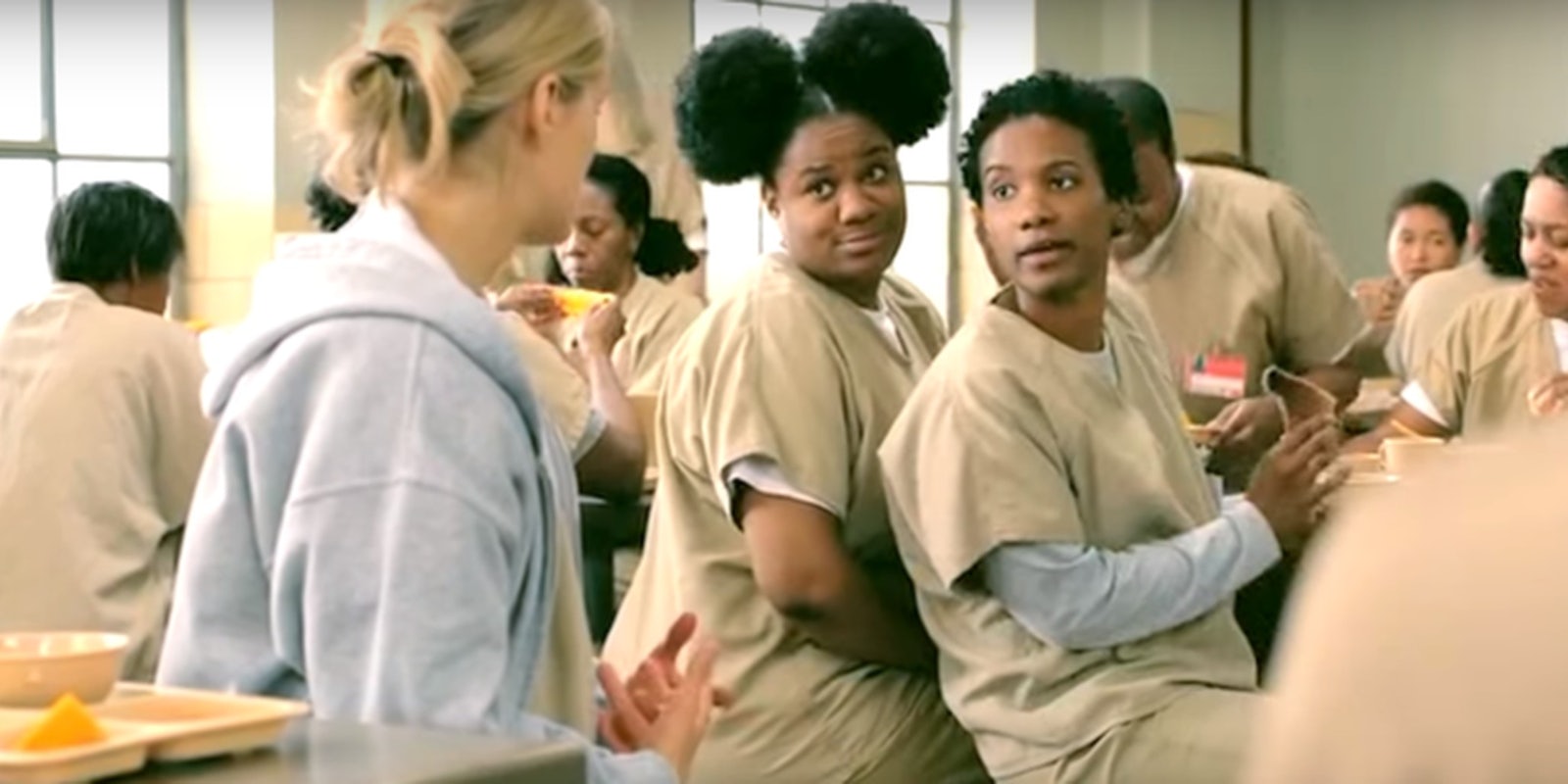Change is afoot for Black Cindy (played by Adrienne C. Moore) and her fellow inmates at Litchfield Penitentiary on season 4 of Orange Is the New Black. Most importantly, it’s become a for-profit prison: That means tighter management, 100 new inmates, and overcrowded quarters for Netflix‘s breakout pack of diverse women.
The ramifications of Litchfield’s new private managers, the Management & Correction Corporation (MCC), certainly can’t be understated.
“[It] effects even [new warden] Caputo, who has now taken the reigns of Litchfield,” Moore tells the Daily Dot. “He sees the day-to-day of what’s going on… Now you’re starting to talk to this company, so to speak, of people who don’t really have a connection with the prison and with the inmates. He’s sort of torn between the outside world and the inside world.”
These new changes also mean that Black Cindy, or Tova as she is now known after her recent conversion to Judaism, faces new difficulties in keeping her faith. “Cindy definitely takes her newfound religion to heart… With this new blood coming in, her newfound beliefs are tested with some of the new inmates,” says Moore.
Getting into character
When we spoke, Moore—who has also worked off-Broadway theatrical shows—was performing as Tranio in a Shakespeare adaptation of Taming of the Shrew at New York City’s Central Park.
“[Theater]’s my gym because it definitely gives me a workout,” explains the actor. “When you do television, you’re filming out of sequence sometimes. You have to ground yourself very quickly in the character and in the work and in the words. I think theater allowed me that sort of sharp, quick focus to do that.”
Last year Moore visited a prison to learn more about the inmates that she portrays. While speaking with a woman who was caught for her involvement in a drug ring, she asked the prisoner what she learned from the experience: “She said, quite frankly, ‘I think everyone has an addiction. Mine was easy money and I got caught for it. But I think everyone has an addiction. It’s just a matter of whether or not it’s going to be your demise as well. Not to say that every addiction is going to land you in a prison but every addiction can lead to a downfall.’” (In case you’re wondering, Moore admits an “addiction” of her own: french fries. “If I could eat french fries every day of my life, I would,” she says.)
But when Moore gets on the set to shoot OITNB, she emulates Black Cindy best while thinking of one simple motto: carpe diem.
“For that, you kind of have to have this—you know—just ready for whatever’s going to happen type of approach,” she says. “And so, I typically try not to think too hard about what I’m going to do in a certain scene with a certain actor in a certain moment because I think that kind of lends its way to not being as improvisational and sort of carefree as one would hope.”
Black Cindy’s continuing travels and travails
Moore’s character has come a long way since her pre-prison days as a kleptomaniac TSA agent with a penchant for being an irresponsible mom. Regardless of her religious conversion, though, Black Cindy’s still up to mischief in OITNB season 4.
“She’s always into some type of money-making scheme so you’ll see what she [does] this season to make sure her commissary dollars stay locked and loaded,” hints Moore. “There might be a question of love for Black Cindy in season 4. So we’ll see how that pans out.”
While commentary on race relations has always had a place on OITNB, it will be front and center in the upcoming season.
Misconduct from a new group of over-aggressive guards, concerned more with orders from management than justice in the prison system, sparks a Black Lives Matter-esque movement at the prison. And we’re pretty sure that Black Cindy won’t shy away from voicing her opinion.
“We really explore segregation and the differences in these communities in more detail this season,” says Moore. “Things kind of come to a head in a huge way that I can’t wait for the fans to see.”


